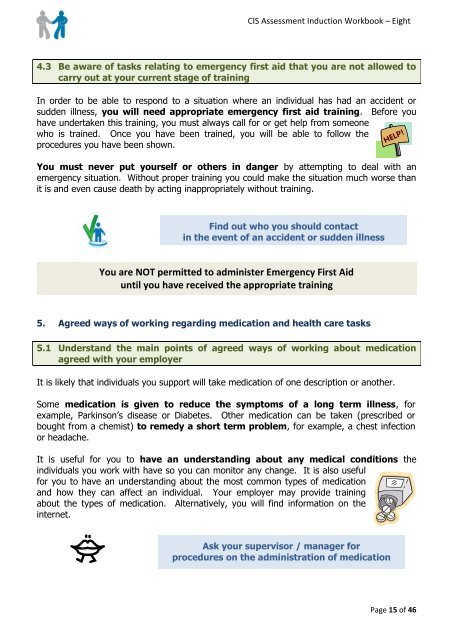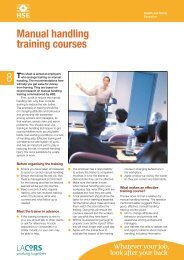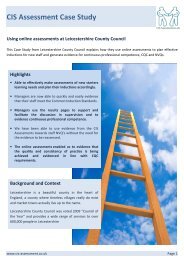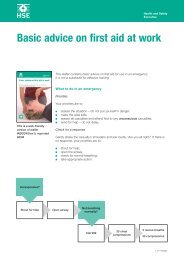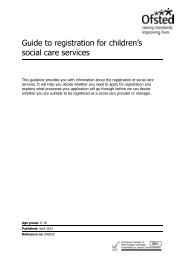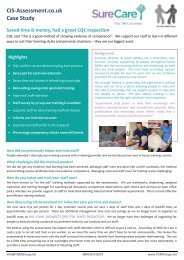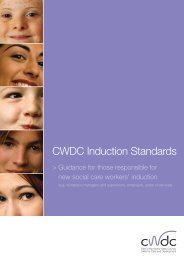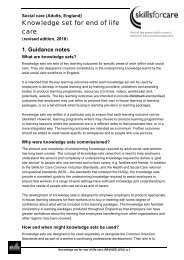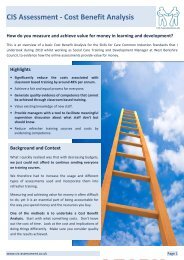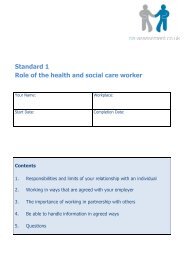Standard 8 Health and safety in an adult social care setting
Standard 8 Health and safety in an adult social care setting
Standard 8 Health and safety in an adult social care setting
Create successful ePaper yourself
Turn your PDF publications into a flip-book with our unique Google optimized e-Paper software.
CIS Assessment Induction Workbook – Eight<br />
4.3 Be aware of tasks relat<strong>in</strong>g to emergency first aid that you are not allowed to<br />
carry out at your current stage of tra<strong>in</strong><strong>in</strong>g<br />
In order to be able to respond to a situation where <strong>an</strong> <strong>in</strong>dividual has had <strong>an</strong> accident or<br />
sudden illness, you will need appropriate emergency first aid tra<strong>in</strong><strong>in</strong>g. Before you<br />
have undertaken this tra<strong>in</strong><strong>in</strong>g, you must always call for or get help from someone<br />
who is tra<strong>in</strong>ed. Once you have been tra<strong>in</strong>ed, you will be able to follow the<br />
procedures you have been shown.<br />
You must never put yourself or others <strong>in</strong> d<strong>an</strong>ger by attempt<strong>in</strong>g to deal with <strong>an</strong><br />
emergency situation. Without proper tra<strong>in</strong><strong>in</strong>g you could make the situation much worse th<strong>an</strong><br />
it is <strong><strong>an</strong>d</strong> even cause death by act<strong>in</strong>g <strong>in</strong>appropriately without tra<strong>in</strong><strong>in</strong>g.<br />
F<strong>in</strong>d out who you should contact<br />
<strong>in</strong> the event of <strong>an</strong> accident or sudden illness<br />
You are NOT permitted to adm<strong>in</strong>ister Emergency First Aid<br />
until you have received the appropriate tra<strong>in</strong><strong>in</strong>g<br />
5. Agreed ways of work<strong>in</strong>g regard<strong>in</strong>g medication <strong><strong>an</strong>d</strong> health <strong>care</strong> tasks<br />
5.1 Underst<strong><strong>an</strong>d</strong> the ma<strong>in</strong> po<strong>in</strong>ts of agreed ways of work<strong>in</strong>g about medication<br />
agreed with your employer<br />
It is likely that <strong>in</strong>dividuals you support will take medication of one description or <strong>an</strong>other.<br />
Some medication is given to reduce the symptoms of a long term illness, for<br />
example, Park<strong>in</strong>son’s disease or Diabetes. Other medication c<strong>an</strong> be taken (prescribed or<br />
bought from a chemist) to remedy a short term problem, for example, a chest <strong>in</strong>fection<br />
or headache.<br />
It is useful for you to have <strong>an</strong> underst<strong><strong>an</strong>d</strong><strong>in</strong>g about <strong>an</strong>y medical conditions the<br />
<strong>in</strong>dividuals you work with have so you c<strong>an</strong> monitor <strong>an</strong>y ch<strong>an</strong>ge. It is also useful<br />
for you to have <strong>an</strong> underst<strong><strong>an</strong>d</strong><strong>in</strong>g about the most common types of medication<br />
<strong><strong>an</strong>d</strong> how they c<strong>an</strong> affect <strong>an</strong> <strong>in</strong>dividual. Your employer may provide tra<strong>in</strong><strong>in</strong>g<br />
about the types of medication. Alternatively, you will f<strong>in</strong>d <strong>in</strong>formation on the<br />
<strong>in</strong>ternet.<br />
Ask your supervisor / m<strong>an</strong>ager for<br />
procedures on the adm<strong>in</strong>istration of medication<br />
Page 15 of 46


